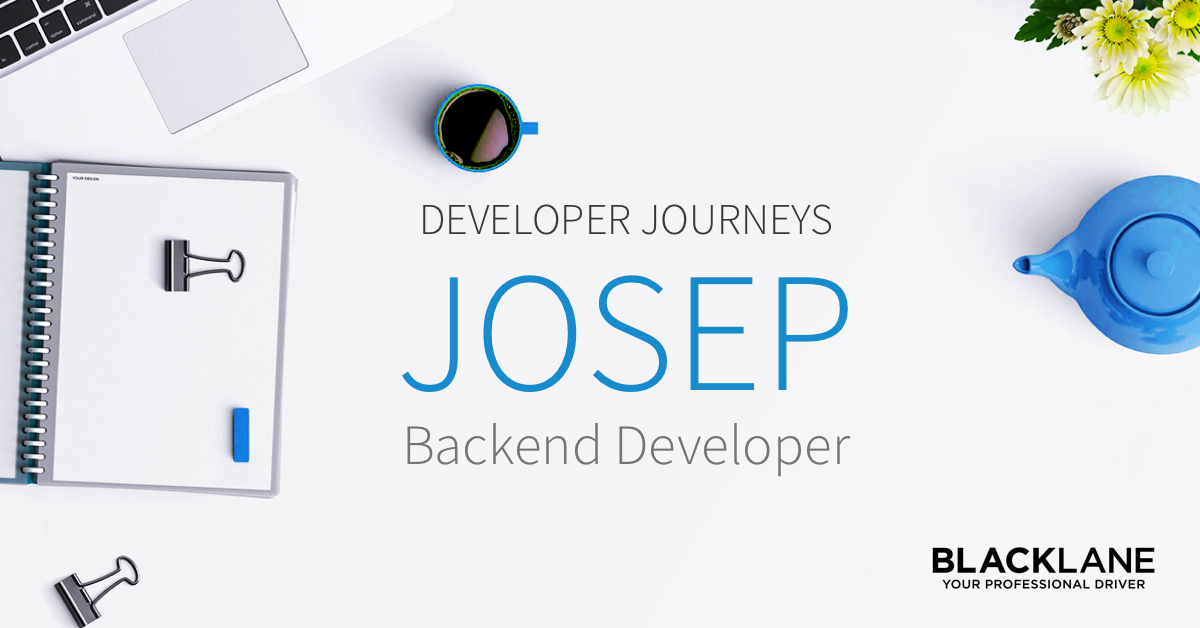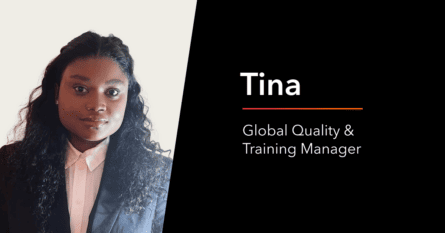This month, we’d like to introduce you to Josep. Josep is a backend developer. He joined Blacklane in August 2014.
Where are you from, and what is your minimum viable autobiography?
I was born, raised, and studied and worked in Barcelona, then lived in Berlin for two years and moved back to Barcelona. I studied physics at university, but at some point I decided that research was not for me, and I felt that I wasn’t good enough at math. I love video editing, and maybe one day I will become a movie director, but I tried the programming route first.
After university, I worked in a small consultancy in Barcelona. That was my first experience with deadlines and requirements. The first startup I worked for was a company based in Ireland, though I was still working from Barcelona. This company helped its users make music videos. They could automatically detect your music and then add video based on its rhythm and beats. I worked on the website and user management side. The user interface product was really cool, the way you could manipulate the video you were creating. But it didn’t take off. Working for a startup is like starting a band. Maybe nobody will come to your show. Then, I worked for a startup that was trying to make a “Facebook for companies.” I’m not sure if they’re still trying to do that, but I didn’t understand what they wanted, and I wasn’t happy with how they were doing things. I met some cool people, but I didn’t stay long, and then I joined Blacklane after that.
When did you realize you wanted to write code for a living?
While I was an intern at my university administrative office, I had the opportunity to automate a few forms students had to manually fill out. One of my original tasks was to review each form and update an Excel sheet, having to read and write each student name, course, and university ID one by one, then count them and review the data before sending a list to each course professor.
It was obvious to me that the process could be improved, a lot. That’s why I proposed to my colleagues that we create a simple web page so students could submit the data, automatically validate it, and store it in a database we could generate reports from. My initial effort estimations were not that good, and I ended up doing it manually the first semester :D, but the form was ready for the next semester and the automation paid off, not only for that year, but for a few more years.
This was my first one-man band experience dealing with real requirements, real users, and a real product. I liked it and the university did, too. That was the moment I realized I could maybe do it for a living.
What brought you to Blacklane?
Ruby and Berlin, in that order.
Before joining Blacklane, I had already coded a few projects using Ruby and Rails, but I wanted to improve. There is this saying, “If you are the best player in the band, leave the band!” And actually, I wanted to be the worst player in the band! Blacklane felt like the band I wanted to be part of back then, and I still feel that way today.
And also Berlin. I noticed a lot of people I was following online worked in Berlin, and the quantity and quality of the technical meetups is just incredible — I would say an order of magnitude higher in any aspect compared to other places. I still remember the first Strange Group meetup I attended about the Elm language. I could barely understand what was shown, and I was lost in the questions.
How did you end up working remotely, and how has that experience been for you?
I like working in an office and I really like Berlin, but priorities change and in 2016 I decided it was my time to move back to Barcelona after two years in Berlin. I still miss the office, but I don’t regret the decision.
Back then, I told the company that it was sad but I was going to move back. To my surprise, the company replied that they still wanted me to contribute and we found ways to keep the relationship, although at a distance.
My team was already distributed when I moved, but I was the first one who started working remotely after a relatively long time working on-site. Initially, Blacklane was not prepared for it, but was eager to try. The first few months, not everything went smoothly, but that has improved a lot, and now there is no appointment without a Hangouts link, so I can always join and participate in anything.
From my personal point of view, I could not be happier about how supportive Blacklane has been in my situation.
What unique challenges do you think remote developers face, and how have you and Blacklane managed to overcome them?
One of the challenges I see is knowing who is who at the company. When working remotely you miss casual encounters on the stairs, you don’t see the other departments and other teams having meetings behind the glass, and you miss many other fortuitous events that help you form all the connections between people and how they contribute to the company.
In the beginning, this was easy to overcome for me, because I still remembered everybody, but time passes, people started to leave, join, or change responsibilities, and then I started losing track.
At Blacklane, we are trying to address this issue, keeping updated information about teams and their projects so you know who to contact depending on what you need. It’s laborious to do but precious information for remote colleagues.
As a developer, how do you feel about living and working in Barcelona? How does it compare to Berlin?
Barcelona and Berlin have a totally different recent history, but they share the same spirit when it comes to embracing new industries. The startup scene in both cities is awesome, but in my opinion Berlin still leads in quantity and quality. I don’t think the two cities need to compete, but rather strengthen their relationship based on their common traits, like technology, arts, culture, etc.
Why do you enjoy staring at a screen for hours and hours every day, manipulating symbols that tell a machine what to do?
Because each day it’s like finishing a 1000-piece puzzle. You feel that warm feeling inside when something works. It’s about having a vague picture in your mind of something and being able to make it something other people, real people can use.
I like that we’re directly helping people, too. Most of the time, we are automating things, or making things easier, or making models that abstract tedious work. I really like this aspect of my job, helping people focus on more important things by creating solutions that abstract away the boring parts and letting them focus on what they really care about and not repetitive tasks.
How do you find working on a team versus working alone?
One never works alone. You might have a very distant relationship with the people who are supporting you, by creating conventions in a web framework like Ruby on Rails, or work really closely on a team by using a microservice your colleague has developed or by pair programming.
On the physical side, it’s a fact that working alone, it’s more difficult to ask for feedback or have a quick chat with somebody unless you explicitly ask on Slack.
Do you have any favorite languages, technologies, or frameworks? What do you like about them? Are there any that you secretly despise?
Many. Most of them share the same attributes: providing a set of conventions to get my idea going without having to deal with small technical decisions at first. A clear example is Ruby on Rails, where conventions are one of the main driving factors of the framework. The same story applies to Ember, and lately I’ve been learning Elixir and what I found most exciting: the OTP libraries and conventions that come with Erlang.
Probably, this has its origin in my first experiences with development tools like Bill Atkinson’s HyperCard, in which you create applications with your own text, images, and default UI elements, connecting buttons, and stacks with minimal glue code.
Do you think you’ll have the chance to use any of these technologies at work? Is that something you hope to able to do?
At the beginning of learning something new, I thought this way. You feel like you want to use it at work. But after learning a few new concepts, you realize you can apply the ideas. You don’t need to apply the whole framework. For example, the functional programming style I learned from Erlang — I can apply it to Ruby, and I don’t have to change the whole tech stack. They’re valuable ideas. Like immutability. I can use it in Ruby. You can also learn from the way the frameworks are implemented and find analogies with your current technologies. Similar problems have similar solutions. Somebody famous said that. So it’s more about bringing in ideas from other technologies, rather than trying to convince your team to try everything new you discover.
What are you looking for in a company when you’re considering a job? What is most important to you, and what is least important?
From my personal point of view, I need to have the feeling I’m learning while being able to contribute as well. It doesn’t need to be a perfect company, either, if there is room to improve, and I can participate in that. I don’t need to find the perfect office. I can help build it. It happened that way with Blacklane. It was already big when I joined, but I liked participating in moving to a new building, creating new teams, and offering my opinion about all of it. I like this. It may be that I feel this way from my experience with Blacklane, but I don’t think that things needs to be ideal from day one. I can help make them more ideal.
What role do developers have in the world, do you think? Are we just passive code robots, or do we have responsibility for the impact of our work on society?
I think the role of the developer is the ultimate way of defining things. It’s about the most precise way to influence our world. But, I don’t see developer as a specific role or job, in the future. Just like monks used to be writers years ago, eventually everybody will be empowered with enough tools and education so they can be developers themselves, the same way I’m a writerright now.
What is it like working in a different country, and culture, than the one in which you grew up?
In my case, Spain shares a lot of the Western capitalist culture, so no big surprises, but a few subtle things changed when I moved to Berlin in 2014. For instance, meetings started on time and, more importantly, ended on time. Also, lunch time was at breakfast time and suddenly afternoons were productive ;).
And when you say 5 minutes it really means 300 seconds.
What do you imagine about your future? Where do you see yourself many years from now, and what do you hope to have accomplished?
In a few years, if I know that I’m helping people, it’s enough for me. Even a few people. I don’t want to work on a solo project that no one is using. I just want to help some people in some way. If at some point, I can reuse the experience I gained to help others, that would be great. Last year, before my daughter was born, I used my professional experience to help local communities around Barcelona. A friend of mine is working in an after-school program for students who need extra care because of their family situation. So I tried to participate in that by introducing them to various technology topics. We used an Arduino to program an LED. OK, everyone is doing that, but they never saw it before. They learned how to change its behavior, the frequency of blinking. Maybe only one of them was interested or even none of them, but they at least learned that they can do it. If I can have more of these experiences and share them at any level, I would be happy. For me, it’s not about any specific company or role.
—
At Blacklane, we have a diverse and growing engineering team. Every month, new faces appear among us, often adding to the long list of countries that are represented here. We started this interview series, because we wanted to give our developers an opportunity to tell us about their background, share their interests, and answer the question, “How did you end up at Blacklane?” We figure everyone has a story to tell, and since Blacklaners come from all over the world, and more and more work all over the world, it’s fascinating to hear about what brought them to our company.



